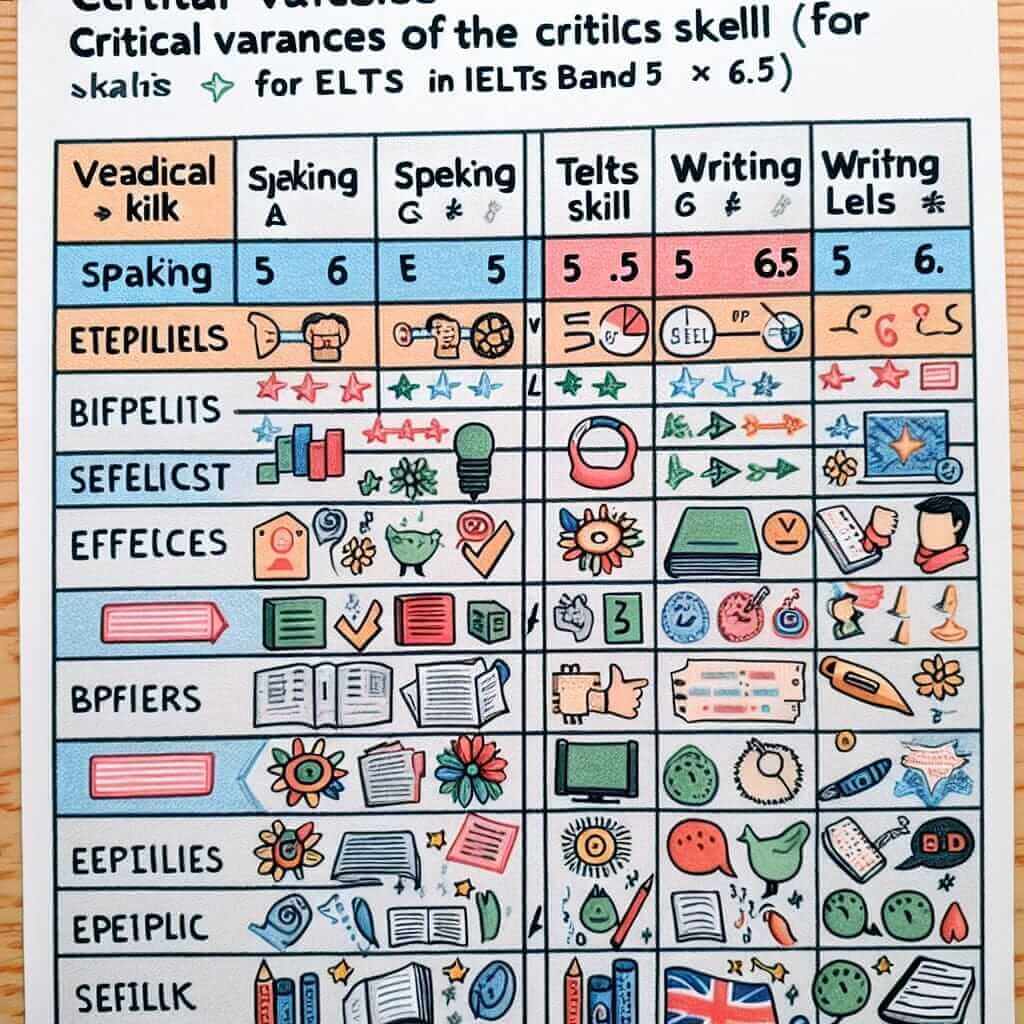The Significance of Moving from IELTS 5 to 6.5
For many aspiring English language learners, particularly those aiming to study, work, or migrate, achieving a specific IELTS band score is a crucial hurdle. The journey from an IELTS band 5 to 6.5 signifies substantial progress in language proficiency and opens doors to a wider array of opportunities. This leap isn’t merely about numerical improvement; it’s about refining core English skills and demonstrating a more sophisticated command of the language.
This article, crafted from my 20 years of experience as an IELTS instructor, delves into the specific challenges faced by individuals aiming to transition from a band 5 to 6.5 and provides practical strategies, insights, and examples to support your journey.
Understanding the Difference: Band 5 vs. Band 6.5
Before we delve into strategies, it’s crucial to understand what distinguishes a band 5 from a 6.5 candidate:
Band 5:
- Speaking: Can communicate basic information but makes frequent grammatical errors, struggles with fluency, and has limited vocabulary.
- Writing: Struggles to express ideas coherently, displays repetitive sentence structures, and makes frequent grammatical and spelling errors.
Band 6.5:
- Speaking: Can communicate clearly on familiar topics, uses a wider range of vocabulary, demonstrates better grammatical control, and maintains a more consistent flow of speech.
- Writing: Can express ideas more clearly and coherently, uses a greater variety of sentence structures, and makes fewer grammatical and spelling mistakes.

Bridging the Gap: Effective Strategies
1. Focused Vocabulary Building:
- Move Beyond General Vocabulary: While a strong foundation in general English is essential, transitioning to a 6.5 requires a more nuanced and topic-specific vocabulary.
- Utilize IELTS Resources: Leverage vocabulary lists tailored for IELTS, focusing on common themes like education, environment, technology, and healthcare.
- Learn in Context: Instead of rote memorization, learn new words and phrases within the context of complete sentences and passages related to IELTS topics.
2. Enhance Grammatical Accuracy:
- Identify Recurring Errors: Analyze your past writing and speaking samples to pinpoint common grammatical errors.
- Targeted Grammar Practice: Dedicate focused time to practice specific grammatical structures that pose challenges. Numerous online resources and textbooks offer targeted grammar exercises.
- Seek Feedback: Regular feedback from a qualified IELTS instructor can be invaluable in identifying and correcting persistent grammatical errors.
3. Improve Fluency and Coherence (Speaking):
- Practice Regularly: The key to fluency is consistent practice. Engage in daily English conversations, even if it’s just with yourself.
- Record and Analyze: Record your speaking practice sessions and analyze them for areas of hesitation, repetition, and grammatical errors.
- Use Linking Words and Phrases: Enhance the flow of your speech by incorporating a variety of linking words and phrases, such as “however,” “in addition,” “consequently,” etc.
4. Develop Cohesive Writing Skills:
- Structure Your Essays Effectively: Familiarize yourself with the standard essay structures for IELTS writing tasks. Ensure clear introductions, well-developed body paragraphs, and concise conclusions.
- Practice Paraphrasing: Mastering paraphrasing is crucial for achieving lexical resource band scores. Regularly rephrase sentences and ideas to avoid repetition.
- Proofread Meticulously: Develop a keen eye for detail. Before submitting any writing task, allocate sufficient time to proofread for grammatical errors, spelling mistakes, and clarity issues.
Example: Analyzing an IELTS Speaking Cue Card
Topic: Describe a time you helped someone.
A Band 5 Response Might Include:
“I help my friend. He study English. I good at English. I teach him.”
A Band 6.5 Response Might Include:
“I vividly recall a time when I assisted a close friend who was grappling with English grammar. Having always had a strong command of the language, I offered to tutor him regularly. We focused on specific grammatical structures that he found particularly challenging, and through consistent practice and guidance, I witnessed significant improvement in his understanding and application of English grammar.”
Top Tips for Success:
- Immerse Yourself in English: Engage with English media, music, podcasts, and books daily.
- Find a Language Partner: Practice speaking with a native speaker or a fellow IELTS candidate to gain confidence and receive feedback.
- Simulate Exam Conditions: Regularly complete practice tests under timed conditions to familiarize yourself with the exam format and pressure.
- Seek Professional Guidance: Consider enrolling in an IELTS preparation course or working with a qualified tutor for personalized feedback and support.
Conclusion
The journey from an IELTS band 5 to 6.5 requires dedication, strategic effort, and consistent practice. By focusing on targeted vocabulary building, enhancing grammatical accuracy, improving fluency and coherence in speaking, and developing cohesive writing skills, you can confidently bridge the gap and achieve your desired score. Remember, consistent effort and perseverance are key. Good luck!